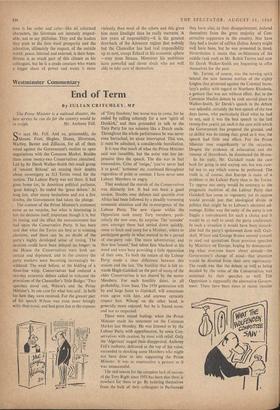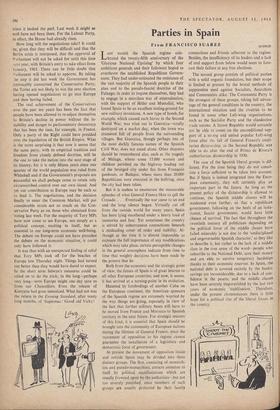Westminster Commentary
End of Term
By JULIAN CRITCHLEY, MP
The Prime Minister is a national disaster, the best service he can do for the country would be
to resign. Mr. Anthony Fell.
SO says Mr. Fell. And so, presumably, do Messrs. Foot, Hughes, Danes, Silverman, Warbey, Baxter and Zilliacus, for all of them voted against the Government's motion to open negotiations with the Common Market. Besides them some twenty-two Conservatives abstained. Led by Sir Derek Walker-Smith this small group of 'ancient Britons' sat nursing their doubts about sovereignty as 313 Tories voted for the motion. The Labour Party was not there. It had gone home (or, in American political parlance, 'gone fishing'). So ended the 'great debate.' At long last, after many hesitations and not a few doubts, the Government had taken the plunge.
The content of the Prime Minister's statement came as no surprise, but what is interesting is not the decision itself, important though it is, but its timing, and the effect the announcement has had upon the Conservative Party. It has been said that what the Tories are best at is winning elections, and there can be no doubt of the party's highly developed sense of timing. The decision could have been delayed no longer; in the House the Conservatives were both un- certain and depressed, and in the country the party workers were becoming increasingly be- wildered. The week before, at the bidding of a three-line whip, Conservatives had endured a two-day economic debate called to welcome the provisions of the Chancellor's 'little Budget.' Two speeches stood out, Wilson's and the Prime Minister's. In one case for what was said: in both for how they were received. For the greater part of his speech Wilson was even more bitingly witty than usual, and had great fun at the expense of 'Tory freedom,' but worse was to come, for he ended by calling solemnly for a new 'spirit of Dunkirk,' and then proceeded to talk to the Tory Party for ten minutes like a Dutch uncle. Throughout the whole performance he was never even barracked, let alone interrupted. This was, it must be admitted, a considerable humiliation.
It is true that much of what the Prime Minister said was inaudible, but the noise was less im- pressive than the speech. The din was in fact tremendous. Cries of 'resign,' you've never had it so good,' norisense' etc. continued throughout regardless of point or content. I have never seen Labour Members so angry.
That weekend the morale of the Conservatives was distinctly low. It had not been a good session. Doubts over defence and quarrels over Africa had been followed by a steadily worsening economic situation and the re-emergence of the Labour. Party. The new vigour within the Opposition took many Tory members, parti- cularly the new ones, by surprise. The 'sounder' ones amongst them had settled down quickly, some to fetch and carry for a Minister, others to participate gently in what seemed to be a period of one-party rule. The more adventurous, and thus less 'sound,' had taken Iain Macleod at his word and were busy providing a little opposition of their own. To both the return of the Labour Party made a clear difference between this session and the last. The hostility that is felt to- wards Hugh Gaitskell on the part of many of the older Conservatives is not shared by the newer Members. For such hostility dates, in all probability, from Suez. The 1959 generation will by and large listen to Gaitskell, will sometimes even agree with him, and anyway certainly respect him, Wilson; on the other hand, is generally more enjoyed; but he is feared more, and not so respected.
There were mixed feelings when the Prime Minister made his statement on the Common Market last Monday. He was listened to by the Labour Party with apprehension, by some Con- servatives with caution, by most with relief. Only the 'Algerians' staged their disapproval. Anthony Fell's outburst, delivered at the top of his voice, succeeded in shocking some Members who might not have done so into supporting the Prime Minister. It was as unattractive a gesture as it was unsuccessful.
The real reason for the complete lack of success of the Tory Right since 1951 has been that there is nowhere for them to go. By isolating themselves from the bulk of their colleagues in Parliament they have also, to their disappointment, isolated themselves from the great majority of Con- servative supporters in the country. Nor have they had a leader of calibre (Julian Amery might well have been, but he was promoted in time). Nevertheless it seems that ex-Ministers of the middle rank such as Mr. Robin Turton and now Sir Derek Walker-Smith are beginning to offer themselves for the part.
Mr. Turton, of course, was the moving spirit behind the now famous motion of the eighty knights that protested against the Colonial Secre- tary's policy with regard to Northern Rhodesia, a gesture that was not without effect. But in the Common Market debate he took second place to Walker-Smith. Sir Derek's speech in the debate was splendid, certainly the best speech of the two days (some, who particularly liked what he had to say, said it was the best speech in the last twenty-five years), yet such is the care with which the Government has prepared the ground, and so skilful was its timing that, good as it was, the speech had little real effect. For the Prime Minister rose magnificently to the occasion. Despite the evidence of exhaustion and the rumour of thrombosis, he dominated the House.
In his reply, Mr. Gaitskell made the case both for going in and staying out, but was care- ful not to say which course he preferred. The truth is, of course, that Europe is more of a problem to the Labour Party than to the Tories. To oppose our entry would be contrary to the pragmatic tradition of the Labour Party that Gaitskell has come to represent; yet to oppose would provide just that ideological divide in politics that might be to Labour's electoral ad- vantage. Either way the unity of the party is too fragile a convalescent for such a choice and it would be as well to await the party conference. In such a situation it would have been remark- able had the party's spokesmen done well. Gait- skell, Wilson and George Brown seemed content to read out quotations from previous speeches by Ministers on Europe, hoping by demonstrat- ing what everyone knew about already—the Government's change of mind—that attention would be diverted from their own equivocacy. The result was that the debate as well as being decided by the votes of the Conservatives was sustained by their speeches as well. The Opposition is supposedly the alternative Govern- ment. There have been times in recent months when it looked the pad. Last week it might as well have not been there. For the Labour Party, in effect, the House had already risen.
How long will the negotiations take? It could be, given that they will be difficult and that the Berlin crisis is interposed, that the approval of P irliament will not be asked for until this time -lest year, with Britain's entry to take effect from lanuary, 1963. There can be little doubt that Parliament will be asked to approve. By taking .he step it did last week the Government has irrevocably committed the Conservative Party; the Tories are not likely to win the next election having opened negotiations to go into Europe and then having failed.
The real achievement of the Conservatives over the past ten years has been the fact that people have been allowed to re-adjust themselves to Britain's decline in power without the in- stability and danger to parliamentary democracy that has been the case, for example, in France. Only a party of the Right could have presided over the liquidation of the British Empire. What is the more surpiising is that now it seems that the same party, with its empirical tradition and freedom from closely defined doctrine, will be the one to take the nation into the next stage of its history; for it is only fifteen years since one quarter of the world population was ruled from Whitehall and if the Government's proposals are successful we shall perhaps come to retain only circumscribed control over our own island. And yet our contribution to Europe may be such as to lead it. The negotiations, and the decision finally to enter the Common Market, will put considerable strain not so much on the Con- servative Party as on those who abstained from voting last week. For the majority of Tory MPs have now come to see Europe, not simply as a political concept, exciting in itself, but as essential to our long-term economic well-being. The debate on Europe could not have preceded the debate on the economic situation, it could only have followed it.
It was thus with an unexpected feeling of relief that Tory MPs took off for the beaches of Europe late Thursday night. Things had turned out better than they would have dared to expect. In the short term Selwyn's measures could be relied on to do the trick; in the long—perhaps very long—term Europe might one day save us from our Chancellors. Even the release of Kenyatta had gone unnoticed. What had not was the return in the Evening Standard, after many long months, of 'Supermac.' Good old Vicky!































 Previous page
Previous page